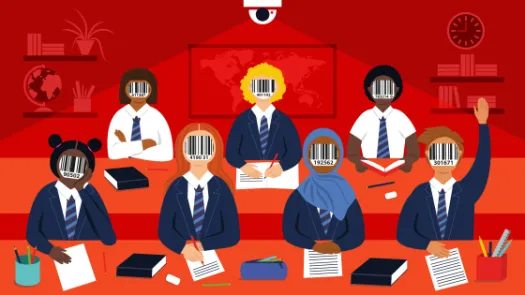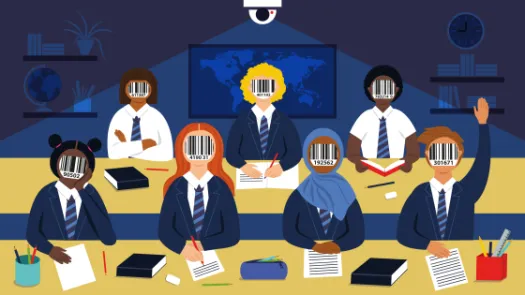
The (un)avoidable rise of Edtech in educational spaces
This piece highlights concerns over the increasing use of data-intensive technologies in educational spaces (EdTech) and examines - among other things - how their unchecked implementation can jeopardize students' rights and education through potential privacy violations, discrimination, and the lack of student input in the adoption of these technologies.

Education is a fundamental human right outlined in the Universal Declaration of Human Rights (Article 26), which states that everyone has the right to education. Schools play a core role in the education of children, but it’s also in schools that children are encouraged to learn to work with others, and to develop their own identities and emotional skills. The education process doesn’t stop there, it continues as children grow and make their way through different higher educational spaces such as high school or even university later on. In this sense along this piece we will refer educational spaces broadly as a schools.
Nothing about this is new, schools have been around for centuries in one way or another, and education has been recognised as a fundamental human right since 1948. So why is PI writing about this topic now?
The ways in which schools and other educational spaces operate have naturally changed and adapted over time, but in recent years the adoption of data-intensive technologies within school environments has been rampant, and they have brought major changes and risks with them that can undermine education in its true and all-encompassing form.
Such data-intensive technologies are being deployed in a variety of contexts within schools: from classroom monitoring, to teaching and learning tools, to access control within schools - sometimes making use of facial recognition and other types of biometrics - to alleged detection of plagiarism, and others. We call this broad category of education technologies ‘EdTech’.
Our research points to a few significant drivers for the rise of Edtech in schools:
The promise of budgetary savings is one of them. Many schools or local governments will implement technologies in the hopes of saving money, reducing administrative costs, speeding up certain tasks or allocating resources more efficiently. In tight economic times, all spending is a trade-off, that means money spent on surveillance tools within schools, can’t be spent on baseline needs such as school meals or increased support of school staff for example.
Another driver for this trend comes from a securitisation angle, where many countries have experienced violent incidents in schools and will seek technology that will alleviate fear or avoid further incidents - this includes technology that could genuinely help in preventing or protecting students from violence but also technologies that would likely not be useful, but create an impression that the responsible body is doing something about the problem.
Finally, a driver that can’t be ignored is the hype associated with Edtech and how schools want to be seen to provide the best possible education to their students. Companies are very effective in marketing their products and in suggesting that they may provide significant educational benefits even when there is no evidence that is the case. Schools often do not have the technical understanding or capability to assess these claims or to assess the trade off they may be making in giving away their students’ data.
Having a grasp of these drivers is helpful in order to understand why Edtech has been on the rise in recent years, and why this does not necessarily nor directly translate to improvements in education within schools, on the contrary - these new technlogies risk undermining the access to education and more.
It’s also important to reflect on the reasons why the deployment of EdTech in schools demands special attention and consideration from us in the first place. So why is this the case?
Firstly, childhood is a unique period of physical, mental, and emotional development. This means that the risks posed by the use some of these technologies might affect, and have deep negative long-lasting and unpredictable effects, in a child’s development and life. These surveillance technologies significantly undermine the trust required for good education - meaning that it can be more difficult for students to ask for help when they need it for example.
Lastly, the educational environment is one of significant power imbalance that affects the nature of agency, and autonomy. Though students are the main target of this technology, there is actually very little they can do by themselves to question or object to the use of potentially problematic tech in their schools. It is their data and their future - but student’s voices are rarely part of the process of procurement of EdTech.
Regarding the rampant and often blind deployment and use of Edtech in schools our concerns of such data-intensive systems from a data protection point of view fall broadly under the following scenarios:
- Intrusivenness - The intrusive nature of many Edtech products infringes upon fundamental rights and freedoms such as privacy, freedom of thought and opinion, access to information, as well as economic, social and cultural rights and freedoms.
- Unlawfulness - Many companies’ current commercial practices in the application of EdTech, including AI, in educational settings are without lawful basis and breach data protection and other laws.
- Procurement issues - There is often a democratic deficit and lack of social consensus in the pre-procurement of these products. This stems also from a lack of engagement with the individuals that will be involved in or affected by the use of these technologies.
- Lack of monitoring - Post-procurement there is often a lack of monitoring around the deployment and application of the products.
- Regulation must come first - Current corporate and institutional practices must change to meet existing data protection laws and regulations, rather than states rewriting data protection law to legitimise current unlawful practices.
These are extremely concerning and we need to act now before these intrusive technologies have a deep long lasting impact on the education of students and their future. If nothing changes in the way these technologies are procured and implemented then schools might be restricting students from their inherent rights and freedoms, with very direct and real potential consequences for their lives, namely:
- Discrimination - Whether in the moment (e.g. a facial recognition system misidentifies or fails to recognise students) or into the future (educational records being used to discriminate in insurance policies), students’ data can potentially be used to make discriminatory decisions about them.
- Chilling effect - The endless tracking of data in schools can create a chilling effect particularly in the securitised environment which can interfere with student’s right to an education and to their own development. This massive data collection can lead to students’ communications being flagged and in the worst case scenario being passed to police or potentially punitive parents - a particular concern for LGBTQI+ students.
- Exclusion - In refusing to share their data through these technologies, it is unlikely that a student can exercise their right to education in the same way, especially if these technologies are considered a barrier to entrance to some content or even school premises.
- Trampling on privacy rights - Students facing this level of data collection, that they may or may not know about and where they are not able to consent regardless of their level of understanding face an invasion of their privacy in a key developmental phase, particularly as many have to go to school by law.
- Quality of education - Whether through questionable tech products that fail to improve education, in funding being diverted away from more appropriate interventions (such as more and more effective teachers) the level of dubious technologies being implemented in schools has the potential to directly imperil the education that students may receive.
As we’ve stated along this piece several times, Education is a fundamental human right - inherent to our human condition and essential for our understanding of the world around us. In this sense, it is of extreme importance to question and keep track of the ways in which schools are evolving to deliver said education. PI is committed to working towards the protection of students’ privacy and human rights, nowadays increasingly threatened by corporate interests and securitisation narratives.
As we’ve stated along this piece several times, Education is a fundamental human right - inherent to our human condition and essential for our understanding of the world around us. In this sense, it is of extreme importance to question and keep track of the ways in which schools are evolving to deliver said education. PI is committed to working towards the protection of students’ privacy and human rights, nowadays increasingly threatened by corporate interests and securitisation narratives.
If you are interested about PI’s work on Edtech and want to know more about the topic, read the next article in our series on the state of the modern school.
This series is possible thanks to the work of Defend Digital Me and Douwe Korff.

